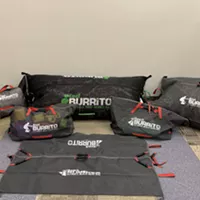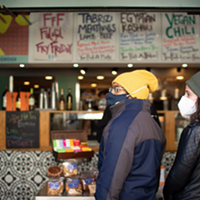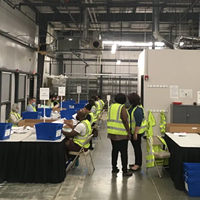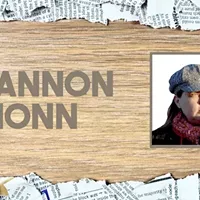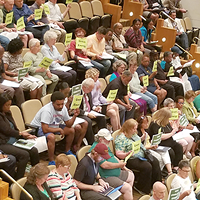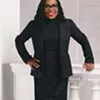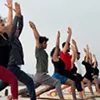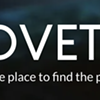I'd like to offer a little insight into my Creative Loafing coverage of Occupy Charlotte. It probably won't surprise readers to learn that my conscious decision to cover the movement from the inside out rather than the outside in, as most traditional journalists would do, has raised eyebrows.
My goal was simple: Give the occupiers' voices the same weight as mainstream journalists give the voices of the entities the occupiers rail against — government and big business organizations that have established platforms and seemingly endless resources with which to share their views.
Fortunately, my editors at CL supported me, making Occupy Charlotte my official "beat." They let me use the paper's resources to test-drive new technologies, effectively allowing me to learn on the job. They've also held me steady while I've walked the line.
From the start, I believed the occupiers' main frustration was that they didn't feel heard. That's why I was there on Oct. 1, 2011, for the duration of the group's first protest, and that's why I chose to spend the night with them during their first camping at Old City Hall. I wasn't there to participate, nor have I ever been; I was there to listen, to document, to ask questions. I felt there was no way to truly understand the movement unless I spent time within it.
I was aware that Occupy Wall Street was going to happen well before the first protester showed up on the streets of New York City on Sept. 17. I watched as the mainstream media virtually ignored the first weeks of the movement, even though that city is teeming with giant news organizations. I wasn't going to allow that to happen in Charlotte, especially after I'd wondered aloud on the CLog, CL's news blog, why no one, at the time, had plans to occupy Trade and Tryon streets.
That doesn't make me a supporter, as some have accused; it means I made a decision to cover the story in a different way — to try out new methods while expanding my skills with video, audio, live-streaming and live-tweeting on the paper's Twitter account. That's what I think Creative Loafing, an alternative news source, should be doing anyway: covering the news with an edge.
This is not a novel idea: Tom Wolfe penned the now-standard J-school anthology, The New Journalism — named for the style of reporting that does not conform to the impartial and (I believe) forced objectivity of traditional journalism — way back in 1973.
Several weeks ago, an editor for another publication told me he was submitting one of my articles for a civic journalism award. "That's cool," I thought. "Now, what's 'civic journalism'?" I sifted through my textbooks and discovered that this type of reporting was barely mentioned, so I poked around online and here's what I learned: civic journalism is "an effort to reach out to the public more aggressively in the reporting process, to listen to how citizens frame their problems and what citizens see as solutions to those problems ... and then to use that information to enrich news stories," according to the website DemocracyPlace.
The Pew Center for Civic Journalism calls it "both a philosophy and a set of values."
The heyday of civic journalism and New Journalism may have passed, replaced by online "citizen journalism," but that doesn't mean that amplifying the people's voice should not still be a goal for some journalists. At least, that's how I see it.
As I take a nostalgic look back at 2011, I see that much of my work was focused more on the people of Charlotte and their concerns than on the concerns of corporations or the government. Plenty of other journalists and media organizations will cover stories from traditional angles. I choose a different path. Citizen journalists? Bring them on. But citizen journalists aren't bound by the same ethical tenets that a professional, independent civic journalist is, nor do citizen journalists have training in areas like checking facts, attributing information properly, and including voices from all sides of an issue.
With the 2012 Democratic National Convention coming — branding itself the People's Convention — I believe we need to hear more, not fewer, voices of regular people to balance the noise coming from big corporations and well-funded politicians. To critics who disagree with this position, I'll quote a friend of mine: "There are a whole lotta ways to live in this great big world." He's right. There's also a whole lotta ways for the media to cover the same news event. That doesn't make one more correct or less correct than the other. Just different.
Image Credit: Occupy Charlotte logo




